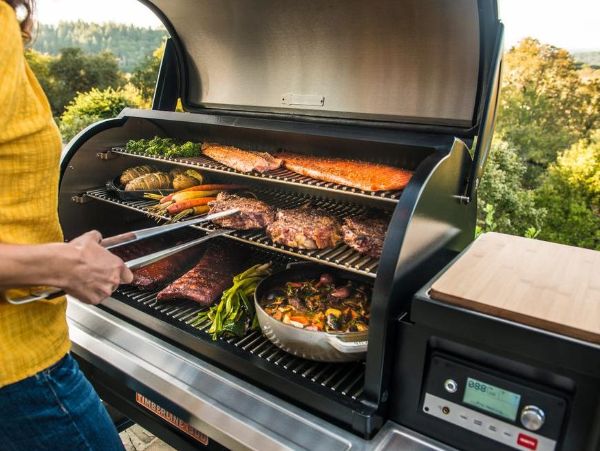Grilling has become a beloved pastime for many food enthusiasts, igniting debates over the best grilling methods and equipment. Among the various options available, pellet grills and gas grills are two popular choices. As an avid grilling enthusiast, I understand the importance of not only delicious flavors but also the health implications of our cooking methods.
In this article, we’ll dive into the sizzling topic of whether pellet grills are healthier than gas grills. Let’s fire up the grill and explore the key factors that contribute to this flavorful debate!

Table of Contents
The Basics: Pellet Grills and Gas Grills
Before we compare their health aspects, let’s briefly understand the basics of pellet grills and gas grills.
- Pellet Grills:
Pellet grills are outdoor cooking appliances that use wood pellets as their primary fuel source. These grills feature an electrically powered auger that feeds the pellets into a firebox, creating heat and smoke for cooking. The temperature can be controlled electronically, allowing for precise heat regulation. Pellet grills are known for their versatility, as they can grill, smoke, bake, roast, and even sear. - Gas Grills:
Gas grills, on the other hand, utilize propane or natural gas as fuel. They consist of burners that produce heat, and the temperature can be adjusted using control knobs. Gas grills offer convenience, with quick heat-up times and easy temperature control. They are commonly used for direct grilling, where food is cooked directly over the heat source.
Heat Source and Potential Health Implications
When it comes to health considerations, the heat source used in grilling plays a significant role. Let’s explore how pellet grills and gas grills differ in this aspect.
- Pellet Grills:
Pellet grills employ wood pellets as their primary heat source, which contributes to the distinct smoky flavor associated with these grills. Wood pellets are generally made from compressed sawdust or wood chips without any additives. The combustion process releases flavorful smoke that infuses the food, enhancing its taste. The use of natural wood pellets can be seen as a healthier option compared to gas grills, as it avoids potential exposure to chemicals or additives. - Gas Grills:
Gas grills utilize propane or natural gas as a heat source, offering convenience and quick heat-up times. However, some concerns arise regarding the potential health implications of cooking with gas. When fats and juices from food drip onto the hot burners or heating elements, they can create smoke and flare-ups. These flare-ups can produce potentially harmful compounds called polycyclic aromatic hydrocarbons (PAHs) and heterocyclic amines (HCAs). Exposure to high levels of these compounds has been linked to certain health risks. However, by employing proper grilling techniques and avoiding excessive flare-ups, the risks can be minimized.
Cooking Method and Nutrient Retention
The cooking method employed by each grill type can also influence the nutrient retention and overall healthiness of the grilled food.
- Pellet Grills:
Pellet grills offer versatility in cooking methods, including grilling, smoking, baking, and roasting. The low and slow cooking technique used in smoking can help retain the moisture and natural flavors of the food, resulting in tender and juicy dishes. Moreover, the controlled temperature and indirect heat of pellet grills contribute to more even cooking, reducing the risk of overcooking and the formation of potentially harmful compounds. - Gas Grills:
Gas grills excel in direct grilling, which involves cooking food directly over the heat source. This method allows for quick searing and browning, locking in flavors and creating enticing grill marks. However, the direct heat of gas grills can lead to faster cooking, potentially resulting in some nutrient loss. Additionally, the higher temperatures and the possibility of flare-ups in gas grilling can lead to the formation of PAHs and HCAs, which are linked to health risks. By practicing safe grilling techniques, such as preheating the grill, keeping it clean, and minimizing flare-ups, you can reduce the formation of these compounds and make your grilling experience healthier.
Additional Considerations
While the heat source and cooking method are crucial factors, there are a few more aspects to consider when evaluating the overall healthiness of pellet grills versus gas grills.
- Cooking Oil: The choice of cooking oil used can impact the healthiness of grilled food. Opting for healthier oils, such as olive oil or avocado oil, can enhance the nutritional profile of your grilled dishes.
- Food Choices: The types of foods you grill play a significant role in the overall healthiness. Opting for lean cuts of meat, poultry, fish, and incorporating a variety of vegetables can contribute to a balanced and nutritious meal.
- Control of Cooking Temperature: Both pellet grills and gas grills offer temperature control, allowing you to cook your food at the desired heat. Monitoring and controlling the cooking temperature can help reduce the formation of potentially harmful compounds.
—
When it comes to determining which grill is healthier, the choice between pellet grills and gas grills is not straightforward. While pellet grills use natural wood pellets and offer controlled temperature for cooking, gas grills provide convenience and quick heat-up times. Proper grilling techniques, such as minimizing flare-ups and choosing lean cuts of meat, are essential in promoting healthier grilling practices.
Ultimately, the key to healthy grilling lies in moderation, variety, and mindful cooking techniques. By making informed choices, employing safe grilling practices, and selecting high-quality ingredients, you can enjoy the flavors and pleasures of grilling while maintaining a healthy lifestyle. So, fire up your grill, savor the deliciousness, and grill responsibly!
